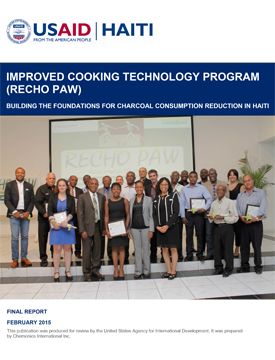Approximately 90 percent of Haitian household energy needs are met by firewood and charcoal, a dependence that is detrimental to the environment and people’s health.

Final Report: Improved Cooking Technology Program (Recho Paw): Building the Foundations for Charcoal Consumption Reduction in Haiti .
Project Report | February 28, 2015

The objective of the Improved Cooking Technology Program (ICTP), also known as Recho Paw, was to help set Haiti on a path toward sustainable cooking solutions and to achieve a significant reduction in charcoal consumption by large-scale users and households in the Port-au-Prince metropolitan area.
The $8.7-million program began in February 2012 in response to Haiti’s excessive charcoal production and consumption, and the resultant environmental impact, such as extensive deforestation, watershed destruction, and increased vulnerability to flooding, mudslides, and soil erosion. ICTP aimed at four intermediate results. The program worked to expand a local market for improved household biomass cookstoves; reduce charcoal consumption; strengthen the legal and regulatory framework for liquefied petroleum gas, improve cooking technologies, and strengthen the management systems of enterprises along the cookstoves supply chain.
